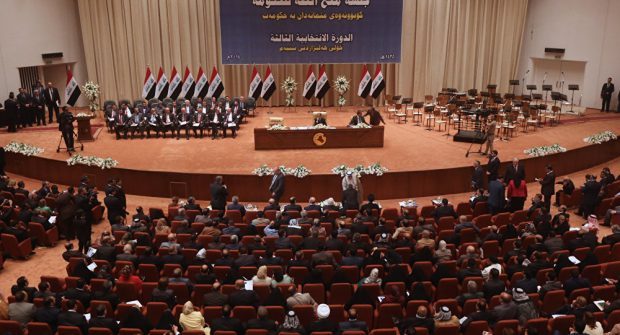The results from this month’s Iraqi elections have made it indisputably clear that Muqtada al-Sadr is a powerful figure in Baghdad who cannot be dismissed. While it’s not yet clear what this will mean for the autonomous Iraqi Kurdistan his past stances may prove informative.
“I think a powerful Sadr in Baghdad means a lot for Kurds in the Kurdistan Region, as Sadr has good ties with Saudi Arabia and his anti-Iranian policy in Iraq is quite advantageous for them,” Lawk Ghafuri, a Kurdish political writer and economic masters degree candidate, told Offiziere. “However a powerful Sadr also means a weaker U.S. in Baghdad, as it’s obvious Muqtada al-Sadr has been opposing the US policy in Iraq for years,” he added.
It’s not yet clear what the future government of Iraq will look like. Michael Knights, a leading Iraq analyst and Lafer Fellow at the Washington Institute for Near East Policy, told Offiziere that he sees scenarios “in which Sadr shapes the next government, is in an Iran-built pan-Shiite government, or is the only major bloc not in the government.”
Knights consequently recommends that it is “best not to assume anything” at such an early stage. He does, nevertheless, point to Sadr’s past interactions with the Kurds, “most notably with the KDP[Kurdistan Democratic Party] in the May 2012 in the attempted vote of no-confidence in [former Iraqi Prime Minister Nouri al-] Maliki, when Muqtada resisted huge Iranian pressure to leave that [former Kurdish President Masoud] Barzani-led effort.”
The KDP is the largest political party in Iraqi Kurdistan and won the most seats among Kurdish parties in the Iraqi Parliament in this election.
Kyle Orton, a UK-based independent Middle East researcher, points to the broader history of Sadr transforming himself from a murderous sectarian thug in the early years of the Iraq War (2003-11) to a more conciliatory and largely non-sectarian nationalist figure in more recent memory.
“Sadr’s messaging has been, as one would expect from a nationalist figure, deliberately conciliatory between Sunnis and Shiites within Iraq, both in rhetoric (condemning Nouri al-Maliki’s anti-Sunni policies) and action (his Peace Companies faction behaved much better than many Hashd al-Shaabi battalions in areas liberated from the Islamic State),” Orton told Offiziere.
He also instances Sadr’s historic visit to Saudi Arabialast year as well as his “attempts to reduce friction between Arabs and Kurds” as positive examples of his conciliatory approach. “Sadr’s stated position on Kirkukis by no means aligned with the KDP, but it purports to be a lot more amenable to compromise than [incumbent Iraqi Prime Minister] Haider al-Abadiproved to be and obviously more so than Iran’s outright proxies such as Hadi al-Ameri,” Orton explained.
Knights also believes that al-Sadr “would be a net positive for the Kurdish people, especially now that Kirkuk is back in federal hands, which has removed one irritant and source of paranoia for Sadrists.”
Ghafuri argues that the most important thing for Kurds presently is “unity in Baghdad”. “We should also remember that after the Kurdistan independence referendum last September Sadr was one of the leaders who suggested to Abadi that he send forces to control border gates of the Kurdistan Region,” he went on to recall. “The first thing the Kurds need to is set some conditions before entreating the coalition to form any government in Baghdad, since forming the government in Baghdad now depends highly on Kurds, especially the KDP,” he reasoned. “I’m saying KDP as the others – namely the PUK [Patriotic Union of Kurdistan] and Gorran[Movement for Change party] – are already considered an Iranian policy implementers in Iraq in Sadr’s perspective.” The PUK is widely alleged, among other things, to have handed over the disputed region of Kirkuk to Iraq last October as part of an Iran-brokered deal.
Orton believes that al-Sadr’s electoral success could lead to the formation of “an ostensibly more moderate, less Iran-friendly governmental coalition in Baghdad combining together al-Sadr and al-Abadi, perhaps with Iyad al-Allawi<’s/a> Al-Wataniya and Osama al-Nujaifi’s Qarar al-Iraqi.”
“If Sadr wins and heads such a coalition he also provides something of a face-saving way for the KDP to re-enter a coalition with Abadi, who could be asked to stay on as prime minister,” he added. Orton also anticipates that in spite of these results “the pillars of Iran’s pervasive influence in Iraq will endure, even if Sadr’s positioning against Tehran is genuine. […] The Kurdistan Region is likely to continue to struggle to make its way within Iraq,” he added, pointing to its devastating loss of Kirkuk in October, the continuing economic crisis in the region as well as the machinations of the PUK in recent months – which Orton says places them “wholly in the Iranian camp”. “This loss of leverage for Erbil is compounded by the better-than-expected showing for the Fatah Alliance, which will further entrench politically the military power that Iran holds in Iraq through its Shiite militias, whose primary antagonist since ISIS receded has been the Kurdish Peshmerga forces under KDP command,” he concluded.

